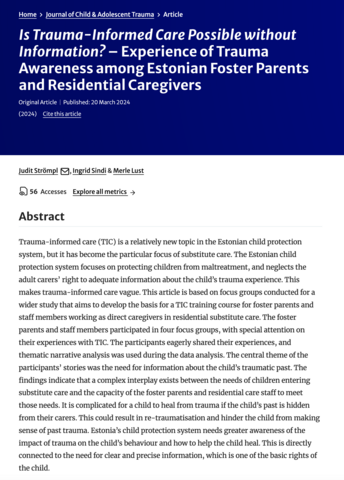Trauma-informed care (TIC) is a relatively new topic in the Estonian child protection system, but it has become the particular focus of substitute care. The Estonian child protection system focuses on protecting children from maltreatment, and neglects the adult carers’ right to adequate information about the child’s trauma experience. This makes trauma-informed care vague. This article is based on focus groups conducted for a wider study that aims to develop the basis for a TIC training course for foster parents and staff members working as direct caregivers in residential substitute care. The foster parents and staff members participated in four focus groups, with special attention on their experiences with TIC. The participants eagerly shared their experiences, and thematic narrative analysis was used during the data analysis. The central theme of the participants’ stories was the need for information about the child’s traumatic past.
The findings indicate that a complex interplay exists between the needs of children entering substitute care and the capacity of the foster parents and residential care staff to meet those needs. It is complicated for a child to heal from trauma if the child’s past is hidden from their carers. This could result in re-traumatisation and hinder the child from making sense of past trauma. Estonia’s child protection system needs greater awareness of the impact of trauma on the child’s behaviour and how to help the child heal. This is directly connected to the need for clear and precise information, which is one of the basic rights of the child.

